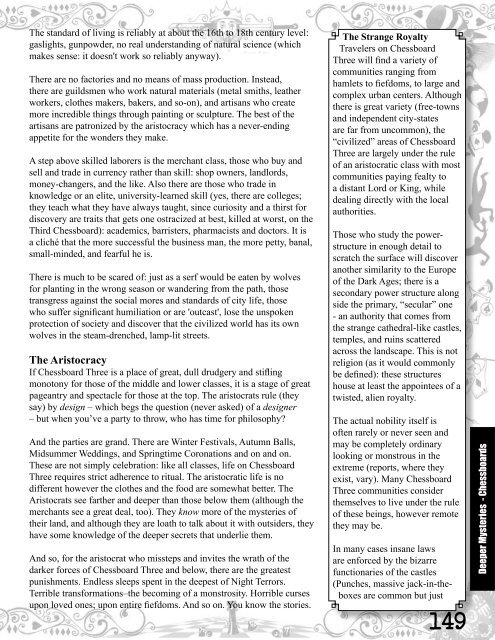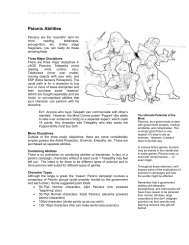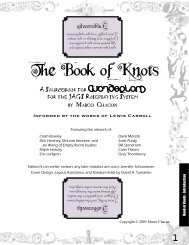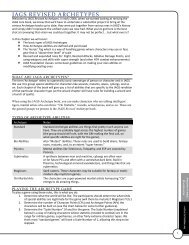Wonderland - Jags
Wonderland - Jags
Wonderland - Jags
You also want an ePaper? Increase the reach of your titles
YUMPU automatically turns print PDFs into web optimized ePapers that Google loves.
The standard of living is reliably at about the 16th to 18th century level:<br />
gaslights, gunpowder, no real understanding of natural science (which<br />
makes sense: it doesn't work so reliably anyway).<br />
There are no factories and no means of mass production. Instead,<br />
there are guildsmen who work natural materials (metal smiths, leather<br />
workers, clothes makers, bakers, and so-on), and artisans who create<br />
more incredible things through painting or sculpture. The best of the<br />
artisans are patronized by the aristocracy which has a never-ending<br />
appetite for the wonders they make.<br />
A step above skilled laborers is the merchant class, those who buy and<br />
sell and trade in currency rather than skill: shop owners, landlords,<br />
money-changers, and the like. Also there are those who trade in<br />
knowledge or an elite, university-learned skill (yes, there are colleges;<br />
they teach what they have always taught, since curiosity and a thirst for<br />
discovery are traits that gets one ostracized at best, killed at worst, on the<br />
Third Chessboard): academics, barristers, pharmacists and doctors. It is<br />
a cliché that the more successful the business man, the more petty, banal,<br />
small-minded, and fearful he is.<br />
There is much to be scared of: just as a serf would be eaten by wolves<br />
for planting in the wrong season or wandering from the path, those<br />
transgress against the social mores and standards of city life, those<br />
who suffer significant humiliation or are 'outcast', lose the unspoken<br />
protection of society and discover that the civilized world has its own<br />
wolves in the steam-drenched, lamp-lit streets.<br />
The Aristocracy<br />
If Chessboard Three is a place of great, dull drudgery and stifling<br />
monotony for those of the middle and lower classes, it is a stage of great<br />
pageantry and spectacle for those at the top. The aristocrats rule (they<br />
say) by design – which begs the question (never asked) of a designer<br />
– but when you’ve a party to throw, who has time for philosophy?<br />
And the parties are grand. There are Winter Festivals, Autumn Balls,<br />
Midsummer Weddings, and Springtime Coronations and on and on.<br />
These are not simply celebration: like all classes, life on Chessboard<br />
Three requires strict adherence to ritual. The aristocratic life is no<br />
different however the clothes and the food are somewhat better. The<br />
Aristocrats see farther and deeper than those below them (although the<br />
merchants see a great deal, too). They know more of the mysteries of<br />
their land, and although they are loath to talk about it with outsiders, they<br />
have some knowledge of the deeper secrets that underlie them.<br />
And so, for the aristocrat who missteps and invites the wrath of the<br />
darker forces of Chessboard Three and below, there are the greatest<br />
punishments. Endless sleeps spent in the deepest of Night Terrors.<br />
Terrible transformations–the becoming of a monstrosity. Horrible curses<br />
upon loved ones; upon entire fiefdoms. And so on. You know the stories.<br />
The Strange Royalty<br />
Travelers on Chessboard<br />
Three will find a variety of<br />
communities ranging from<br />
hamlets to fiefdoms, to large and<br />
complex urban centers. Although<br />
there is great variety (free-towns<br />
and independent city-states<br />
are far from uncommon), the<br />
“civilized” areas of Chessboard<br />
Three are largely under the rule<br />
of an aristocratic class with most<br />
communities paying fealty to<br />
a distant Lord or King, while<br />
dealing directly with the local<br />
authorities.<br />
Those who study the powerstructure<br />
in enough detail to<br />
scratch the surface will discover<br />
another similarity to the Europe<br />
of the Dark Ages; there is a<br />
secondary power structure along<br />
side the primary, “secular” one<br />
- an authority that comes from<br />
the strange cathedral-like castles,<br />
temples, and ruins scattered<br />
across the landscape. This is not<br />
religion (as it would commonly<br />
be defined): these structures<br />
house at least the appointees of a<br />
twisted, alien royalty.<br />
The actual nobility itself is<br />
often rarely or never seen and<br />
may be completely ordinary<br />
looking or monstrous in the<br />
extreme (reports, where they<br />
exist, vary). Many Chessboard<br />
Three communities consider<br />
themselves to live under the rule<br />
of these beings, however remote<br />
they may be.<br />
In many cases insane laws<br />
are enforced by the bizarre<br />
functionaries of the castles<br />
(Punches, massive jack-in-theboxes<br />
are common but just<br />
149<br />
Deeper Mysteries - Chessboards





